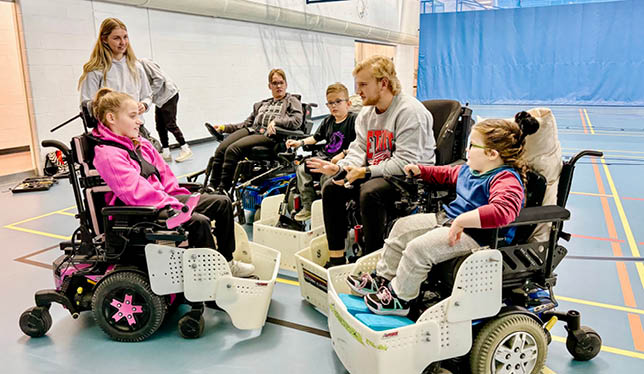Inspired by his brother, Chase Petruska, a graduate student at the University of Lethbridge, has created a powerchair soccer league for people with physical disabilities.
Mr. Petruska grew up in Calgary with his brother who has cerebral palsy and is limited to a wheelchair. When his brother was 12 years old, he joined a powerchair hockey league in which Mr. Petruska eventually participated as a coach. and is still involved with to this day as a coach and board member. Mr. Petruska was disappointed when he came to Lethbridge for university and realized that there were no powerchair sports leagues in the city. This inspired him to start one himself.
“it was pretty disheartening to me to see that not being an option for individuals who have physical disabilities, so I looked to get funding…I felt I could make a difference there,” he said.
When he launched the league, Mr. Petruska said the response from players was very positive.
“It’s been really heartwarming for me … I can tell how much they enjoy it because when we do have time off they’re itching to get back. And for the players, it’s huge. I’ve had a lot of players come up to me and tell me how much powerchair sports and how much powerchair soccer means to them, because for them, it’s two hours where they’re no longer just an individual with a physical disability. They’re an individual that’s an athlete,” he said.

Mr. Petruska said there were challenges in launching the league as finding a gym and reserving gym time was difficult. However, the U of Lethbridge helped out not only with funding the project but with offering access to a gym with a 50 per cent discount, storing the powerchairs and helping with recruitment of players. Mr. Petruska said they used traditional advertising such as TV ads and posters to recruit players while also reaching out to local school districts to ask if they had anybody who they would recommend the league to. Players in the league range from five years old to adults with the oldest player being in their late 40s.
The league is helping Mr. Petruska in his research for his master’s thesis on the mental health and stress faced by people with physical disabilities. Mr. Petruska has also recruited players in the league to participate in his research on how power chair sports impacts the mental health of people with physical disabilities. Players who have agreed to participate in the study have been answering questionnaires and providing urine and saliva samples. He is currently in the process of doing analysis but is already seeing that there is a biological change that can be seen from tracking of metabolomics in participants as a result of the league.
One of the first members of the U of Lethbridge league was Angelina Froese. Ms. Froese said she appreciates how the league welcomes everyone no matter how much experience they have in powerchair sports but now that she has been a part of the league for a while she hopes for more people to participate in the future so that she can play with more experienced players.
Ms. Froese said that for her and many of the other players with physical disabilities, playing sports was never something they thought they would get the opportunity to do in their life, but that this league gave them a chance to do so. Ms. Froese also credits the coaches for how they trained new players.
“They take it slow and even though we make mistakes they just keep going and don’t stop until we get it right. It just shows that they have patience and they care about people with special needs,” she said.
Going forward, Mr. Petruska is hoping to improve the league with more players, more tournaments, and investing in more specialized powerchairs.
Suggestion to use a more inclusive language such as uses a wheelchair compared to “limited to a wheelchair”.